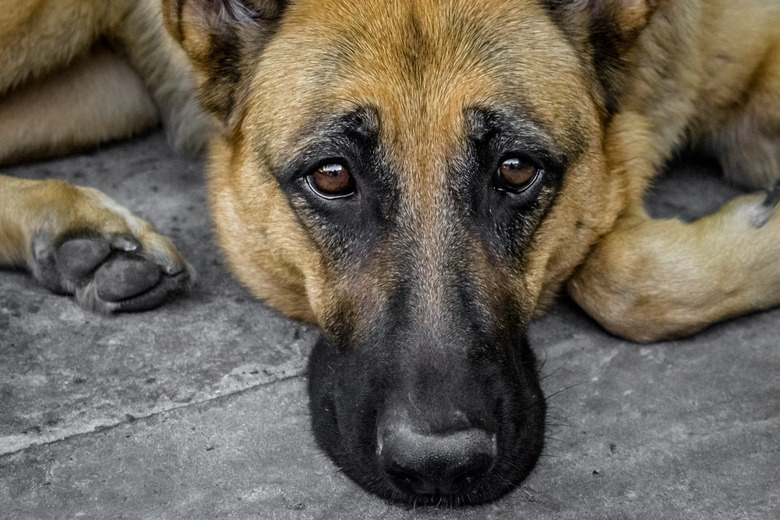How Can I Tell If My Dog Is Depressed?
Science has shown that dogs are capable of experiencing a range of emotions that were once thought to be limited to humans. Depression, experienced by millions of people worldwide, can also affect our dog friends. Canine depression has a number of causes, but you can learn to recognize the signs and develop a treatment plan for your pup.
What is depression?
What is depression?
Depression is a mental health condition that causes feelings of sadness, loss of interest in usual activities, changes in appetite, and trouble sleeping, among other symptoms.
Depression can affect the normal functioning of brain chemicals and structures. There haven't been many scientific studies on canine depression. Though experts believe it is likely that dogs' brains are affected by this condition in much the same way as humans.
What causes depression in dogs?
What causes depression in dogs?
Canine depression is frequently a response to a trigger of some kind, often a life-changing event. Though there are other causes too. Stressful events such as moving to a new home, an additional pet, or a new baby joining the family can impact a dog's mental health. Certain dogs like seniors, dogs with medical conditions, and even specific breeds may be more sensitive to environmental changes.
Dogs may also experience depression following the loss of a companion. Like humans, dogs can grieve the loss of a family member, whether it is a human or another pet. Dogs are sensitive to the emotions of their people and may pick up on the feelings of grieving household members.
A dog with a medical condition that causes pain or otherwise interferes with their ability to do their favorite things — go for walks, play with toys, run around the yard — can also cause depression. Dogs who have experienced abuse, neglect, or other forms of trauma are more likely to become depressed.
Common dog depression symptoms
Common dog depression symptoms
Symptoms will vary between individuals, but changes in a dog's normal behavior or body language could indicate depression. Often, a depressed dog will be uninterested in their favorite activities. They may no longer get excited about playtime, walks, or trips to the dog park. They may be lethargic or experience sleep disturbances.
Changes in appetite are also common with canine depression, and dogs may lose interest in their usual meals or favorite treats. A change in a dog's overall demeanor or body language could also be a sign of depression. Some dogs may become more clingy, while others may become withdrawn. They may exhibit anxious behaviors such as paw licking or pacing, and may also develop separation anxiety.
How to help a dog with depression
How to help a dog with depression
If you notice changes in your dog's behavior, take them to your veterinarian for a checkup. Symptoms of depression can mimic those of physical conditions, so start by ruling out an underlying cause.
Consider any recent changes to your dog's life to determine how you can help them cope. Dogs thrive on routine, and maybe yours has gotten thrown off recently. Create a predictable routine for your dog that you can easily stick to. Consider hiring a dog walker to fill in the gaps, or purchase an automatic feeder if your dog's meal routines have been affected.
Babies and new pets can be overstimulating, and your dog might be craving some alone time. Give your dog a space of their own — a room, crate, or a spot that can otherwise be blocked off to babies and other pets — and use positive reinforcement training with them to make their "room" a peaceful, happy place.
A new addition to the family could cause your dog to feel depressed about getting less attention. Spend extra time with your dog doing their favorite activities. They might be thrilled to go for a one-on-one walk, play in the yard, or snuggle up with you before bed. Individualized attention of any kind can help reassure a depressed dog.
Behavioral training and medication for dogs with depression
Behavioral training and medication for dogs with depression
If your dog's depression hasn't improved after making environmental changes, seek the help of a professional. Working with a behaviorist and/or dog trainer for behavioral changes can give you more insight into what the issue is and how you can address it.
If depression is impacting your dog's quality of life, medication such as Prozac and antidepressants can be a good treatment option. Medication isn't a cure-all, though, and an effective treatment plan for depression should include a combination of pharmaceuticals, environmental management, and behavior modification rather than just one modality.
The bottom line
The bottom line
Dogs can experience depression in response to a major life change like a move, a new baby, or the loss of a family member. Dogs with traumatic pasts may suffer from more chronic depression. By making environmental changes, seeking help from a behaviorist, and discussing medication with your veterinarian — you can help your dog get back to feeling their best.



